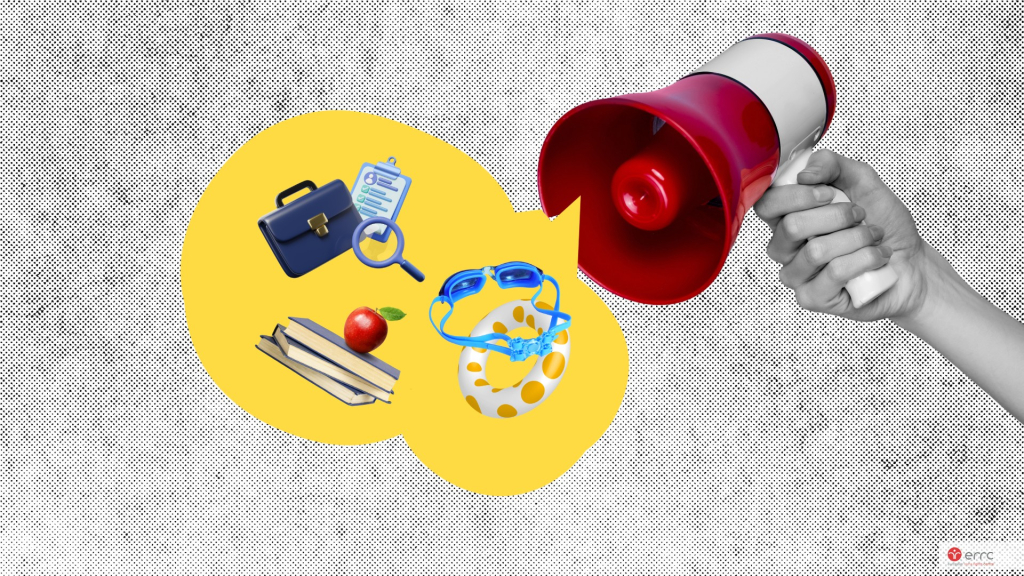Roma in Bulgaria Push Back Against Everyday Discrimination With Four New Legal Actions
22 August 2025

Judit Ignácz
Going out for dinner, spending a sunny day at the pool, applying for a job, or sending a child to school. These are small, regular, everyday moments that most people take for granted. However, for many Romani people, accessing these ordinary spaces is often marked by constant obstacles and rejection.
In recent months, several incidents in Bulgaria have shown the constant and systemic discrimination that Romani people face in their daily lives. The ERRC has supported the Bulgarian NGO Drom to bring legal complaints in four cases of discrimination between February and June this year, highlighting instances of ethnic bias in employment, education, and access to public spaces. Although each case is unique, they reflect how deeply embedded prejudices, anti-Roma racism, and exclusion can manifest into concrete, systemic violations of rights in real life.
Denied employment because of ethnicity
In January 2025, officials rejected a Romani man's job application for a municipal “Cleanliness” program, which was designed to provide one-year jobs to long-term unemployed people. The officials ignored the Romani man’s application even though positions were available. When the man went to the municipality in question to ask for clarification, staff denied that there were openings and expelled him from the building after calling him a “lazy gypsy” and a “thief.” Later, officials tried to justify the rejection by stating it was due to his “bad reputation.”
Racist threats of school expulsion
That same month, the parents of an eighth-grade Romani girl contacted Drom after the school threatened to expel her for unexcused absences. The school principal justified the decision by stating that “The Roma girl will run away from school because she wants to get married and not study.” The school ignored her good grades, her parents’ wish for her to continue studying, and the Bulgarian Education Act, which allows schools to create individual learning programs to support students.
Refused access to public spaces
Discrimination has also appeared in public spaces. In August 2024, swimming pool staff in Vidin refused entry to a group of Romani boys while allowing others to enter freely. The boys overheard staff say that their ethnicity was the reason for exclusion. In January 2025, a Romani couple who had recently returned from Germany tried to celebrate a birthday at a restaurant by the Danube. Even though there were empty tables, staff and security denied their entry, insulted them with racist slurs, and threatened to beat them.
These are everyday examples of discrimination. In the quiet corridors of municipal offices, school hallways, and local restaurants, a clear pattern has reemerged over the past year in Bulgaria. Authorities, institutions, schools, and businesses deny Romani people basic rights to work, education, leisure, and safety, and treat them with hostility, humiliation, and exclusion because of their ethnicity.
Taking legal action
Supported by the ERRC and leading Bulgarian human rights activists and advocates, Drom has provided ongoing guidance, legal consultation, and support to victims. Formal complaints for all four cases were taken to the Regional Office of the Commission for Protection from Discrimination (CPD) in June 2025. The complaints are based in alleged violations of the Bulgarian Protection Against Discrimination Act and relevant European human rights standards.
Each incident, whether denial of work, school exclusion, blocked access to leisure, or verbal abuse, reveals how anti-Roma sentiment is embedded in Bulgaria’s institutions. Bulgaria’s ongoing human rights crisis is not just about individual acts of discrimination but part of a decades-long history of broader, systemic injustices.
A question of systemic racism
Bulgaria’s legal framework and its legal obligations as an EU member explicitly prohibit discrimination. Still, enforcement often remains uneven, which is confirmed by the ERRC’s research and litigation that highlights deeply embedded prejudices and structural racism across different sectors, such as the child care system, where Romani children are disproportionately placed in institutional care and where poverty becomes an unlawful justification for family separation.
Additionally, school segregation continues to force Romani children into separate, underfunded classrooms, taking away equal education opportunities from them. Discrimination in healthcare pushes Romani people to face barriers to treatment and unequal access to essential services. The demolition of over 200 Romani homes in Sofia in May 2025 left many Romani families, women, and children homeless and vulnerable. Meanwhile, racist rhetoric and hate speech from political officials fuel hatred, a hostile climate, and normalise anti-Roma discrimination and human rights violations of Roma rather than prevent or challenge them.
Discrimination is reinforced when violations of laws and equal treatment stay unreported or are dismissed as isolated events rather than systemic ones. As long as Romani people are turned away from jobs, schools, pools, and restaurants simply because of who they are, the promise of equality remains unfulfilled. But every complaint filed, every court victory, act of legal advocacy, human rights reporting, and demand for equality are steps forward toward justice.
 |




